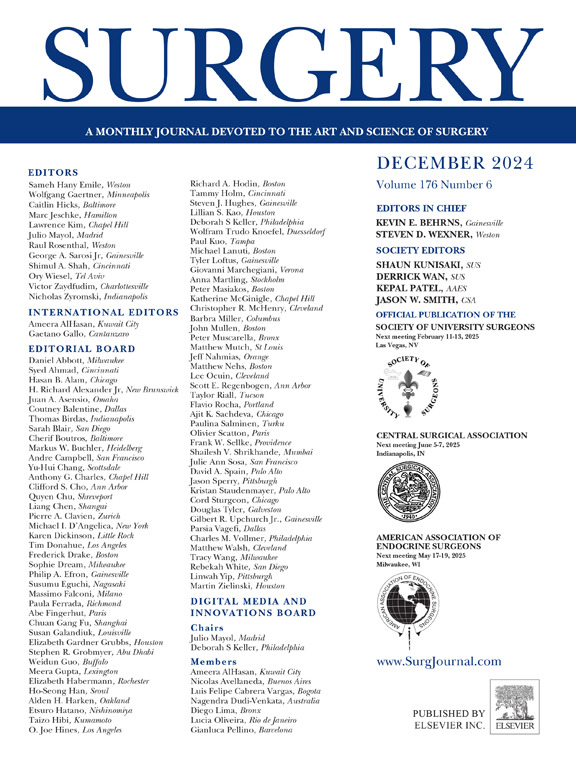单纯手术治疗病理 T1N0 食管鳞癌的复发和预后预测因素。
IF 3.2
2区 医学
Q1 SURGERY
引用次数: 0
摘要
背景:病理诊断为 T1N0 食管鳞状细胞癌并仅接受手术治疗的患者预后良好,一般无需辅助治疗即可随访。然而,在这一患者群体中也发现了复发现象。因此,本研究旨在确定单纯手术治疗的病理T1N0食管鳞状细胞癌患者的复发情况和预后因素:2003年8月至2018年11月期间在广岛大学医院接受食管切除术并行R0切除的532例患者中,124例仅接受食管切除术且病理类型为T1N0食管鳞状细胞癌的患者被纳入研究。分析了复发和预后因素,并评估了复发的详细情况:结果:5年无复发生存率和5年总生存率分别为84.7%和87.2%。12例(9.7%)患者出现复发。单变量和多变量分析显示,组织学类型(分化差与其他)和淋巴和/或血管侵犯(阳性与阴性)对无复发生存率有显著统计学意义。无复发生存率和总生存率的卡普兰-梅耶曲线显示,这些因素对预后有明显的分层作用。分化不良、淋巴和/或血管侵犯阳性的所有患者均有复发,且复发模式均为远处转移:分化不良、淋巴和/或血管侵犯是单纯手术治疗病理T1N0食管鳞状细胞癌的重要复发和预后预测因素。有这些预后因素的患者复发率会升高,而且往往伴有远处转移。因此,辅助治疗可能对这类患者有益,并应间隔更长的时间进行随访。本文章由计算机程序翻译,如有差异,请以英文原文为准。
Recurrence and prognostic predictors in pathologic T1N0 esophageal squamous cell carcinoma treated with surgery alone
Background
Patients diagnosed with pathologic T1N0 esophageal squamous cell carcinoma and treated with surgery alone have a good prognosis and are generally followed up without adjuvant therapy. However, recurrence has been observed in this patient group. Therefore, this study aimed to identify recurrence and prognostic factors in patients with pathologic T1N0 esophageal squamous cell carcinoma who were treated with surgery alone.
Methods
Of the 532 patients who underwent esophagectomy with R0 resection at Hiroshima University Hospital between August 2003 and November 2018, 124 who underwent only esophagectomy and had pathological T1N0 esophageal squamous cell carcinoma were included in the study. Recurrence and prognostic factors were analyzed and details of recurrence were evaluated.
Results
The 5-year recurrence-free survival and 5-year overall survival rates were 84.7% and 87.2%, respectively. Recurrence was observed in 12 (9.7%) patients. Univariate and multivariate analyses showed that the histologic type (poorly differentiated compared with others) and lymphatic and/or vascular invasion (positive compared with negative) were statistically significant for recurrence-free survival. Kaplan–Meier curves for recurrence-free survival and overall survival showed that prognosis was significantly stratified according to these factors. All patients with poorly differentiated and positive lymphatic and/or vascular invasion experienced recurrence and recurrence pattern is all distant metastases.
Conclusions
Poorly differentiated and lymphatic and/or vascular invasion are important recurrence and prognostic predictors in pathologic T1N0 esophageal squamous cell carcinoma treated with surgery alone. Patients with these prognostic factors experienced increased recurrence rates, often with distant metastasis. Therefore, adjuvant therapy may be beneficial for such patients and follow-ups should be performed at closer intervals.
求助全文
通过发布文献求助,成功后即可免费获取论文全文。
去求助
来源期刊

Surgery
医学-外科
CiteScore
5.40
自引率
5.30%
发文量
687
审稿时长
64 days
期刊介绍:
For 66 years, Surgery has published practical, authoritative information about procedures, clinical advances, and major trends shaping general surgery. Each issue features original scientific contributions and clinical reports. Peer-reviewed articles cover topics in oncology, trauma, gastrointestinal, vascular, and transplantation surgery. The journal also publishes papers from the meetings of its sponsoring societies, the Society of University Surgeons, the Central Surgical Association, and the American Association of Endocrine Surgeons.
 求助内容:
求助内容: 应助结果提醒方式:
应助结果提醒方式:


